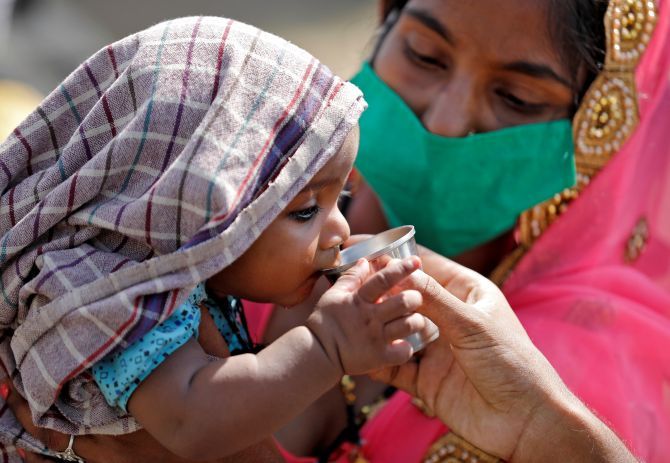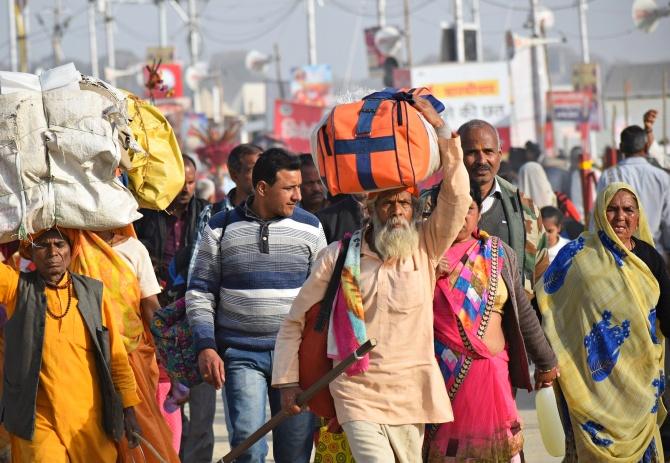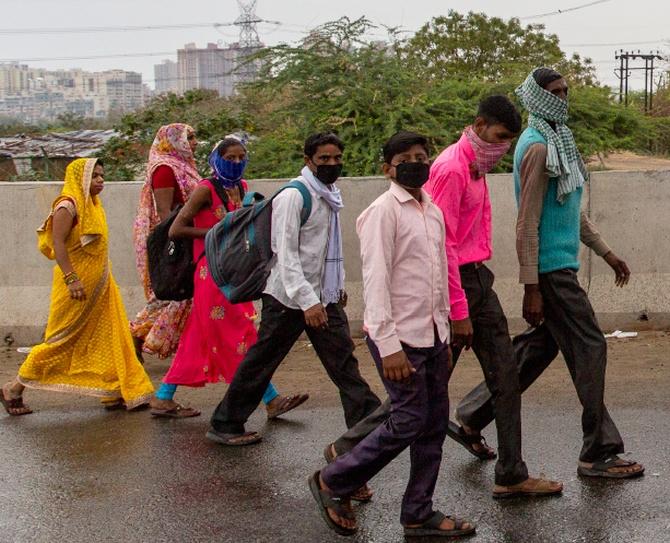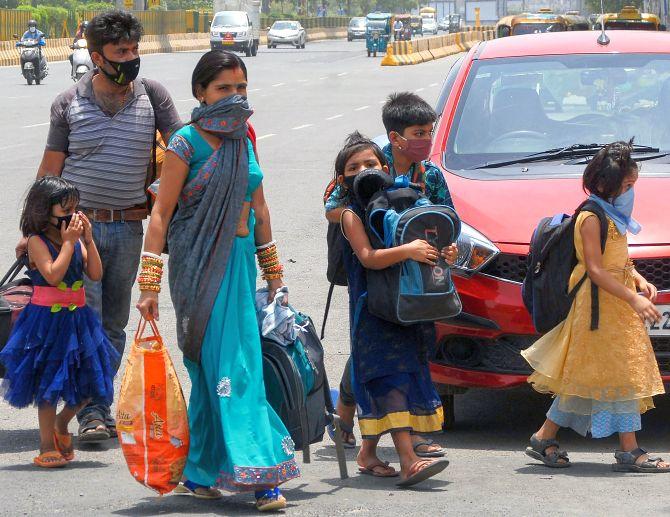In one case, the folks at SWAN discovered that of the Rs 1,500 they'd transferred as relief in the account of a stranded worker, the bank had deducted Rs 800 as penalty for not having minimum balance!
Geetanjali Krishna reports on a group of volunteers who are highlighting the plight of workers.

On May 26, the Supreme Court took suo motu, cognisance of the migrant crisis triggered by the lockdown.
It directed state governments not to charge travel fares and ensure that migrants were given food and water.
Yet, in the midst of an unforgiving Indian summer and two cyclones, the dismal saga of their long march home continues.
Their collective experience and stories of shared deprivation wouldn't have been as visible if it weren't for Stranded Workers Action Network or SWAN.
A group of volunteers associated with different campaigns and organisations that came together in the early days of the lockdown to connect migrant workers stranded across India to relief efforts closest to them, SWAN has been documenting migrant workers from the beginning of the lockdown in India.
A fair mix of quantitative data and qualitative experiences, their reports present a picture of the misery that workers across the country have faced because of the long, poorly planned lockdown.
"When the lockdown began, our initial needs assessment of migrant workers made us realise we had to create a holistic picture of the problem at hand," says Sakina Dhorajiwala of SWAN, who has co-authored the reports with Azim Premji University faculty members Rajendran Narayanan and Seema Mundoli, and Anindita Adhikari, PhD scholar at Brown University.

SWAN's first report, 21 Days and Counting: COVID-19 Lockdown, Migrant Workers, and the Inadequacy of Welfare Measures in India was released on April 15.
A survey of the 11,159 workers they'd helped directly or indirectly, revealed a massive hunger crisis.
"At this time, the primary need was for rations and cooked food," she says.
When they were compiling their second report, 32 Days and Counting, the folks at SWAN found evidence of growing distress amongst migrant workers and the inadequacy of current relief measures.
Many were being evicted or threatened with eviction for non-payment of rents. Others had loans they weren't in a position to repay.
In one case, the folks at SWAN discovered that of the Rs 1,500 they'd transferred as relief in the account of a stranded worker, the bank had deducted Rs 800 as penalty for not having minimum balance! They forced the bank to reverse the charge.
Among the 16,863 workers contacted for the report, 4,823 were stranded in Maharashtra; 4,736 in Karnataka; 1,869 in Uttar Pradesh and 1,361 in Delhi.

Thirty two days into the lockdown, SWAN found that four out of five workers they spoke to hadn't been able to access government rations, while 68 per cent still didn't have access to cooked food!
Half the people surveyed reported having rations for less than one day; almost all had been eating sparsely to make whatever they had, last longer.
As of April 26, only about six per cent of their respondents had received full wages during the lockdown. About 78 per cent hadn't been paid at all.
Over 99 per cent of the self-employed (such as street vendors and rickshaw pullers) earned nothing during the lockdown.
"At this juncture we realised that the magnitude of this problem was such that it needed government intervention," says Dhorajiwala. "Whatever civil society did was simply not going to be enough..."

SWAN volunteers (now differentiated into regional and task-specific groups) have been documenting migrants' journeys home.
"Fearing the disease, people just want to somehow get home in spite of job opportunities again becoming available in cities," Dhorajiwala reports.
"But the lack of information and limited means of transport has rendered the situation chaotic."
The group is discovering that people are willing to pay bribes and hefty premiums just to somehow get home -- even though many are unable to pay rent or repay outstanding loans.
"We've been helping people find tickets by using less-frequented routes and lesser known stations," she says.
"We've also found some district administrations, such as Ludhiana, Goa and Delhi, to be most responsive to the plight of workers."
Going forward, the folks at SWAN plan to continue documenting the impact of the lockdown.
The idea is to develop a Standard Operating Procedure for travel as well as to advocate for more compassionate policies.
"Most of all," says Dhorajiwala, "we want to continue giving voice to the workers' misery and ensuring their experiences don't go unheard."
Learn more about SWAN from their Facebook and Twitter handles. Their reports are on https://covid19socialsecurity.wordpress.com
Production: Rajesh Alva/Rediff.com












 © 2025
© 2025